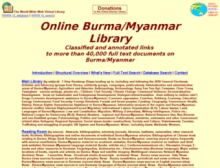Resource information
Abstract: "This
paper
draws
on
case
studies
of
Burmese
migrants
in
the
city
of
Chiang
Mai,
Thailand,
to
explore
concepts
and
theories
of
migration,
uneven
development
and
acculturation
in
which
migrants
engages
in
the
new
environment
of
urban
societies.
It
examines
the
new
emergence
of
push-pull
factors
of
migration,
mainly
economic
reason
and
urban
attractions,
which
bring
Burmese
migrants
into
the
city.
Further,
the
paper
pays
more
attention
on
the
concept
of
uneven
development,
which
comes
along
with
the
process
of
development
in
urban
areas.
It
discusses
about
the
cities
like
Chiang
Mai
as
a
place
where
provides
residents
to
access
not
only
greater
opportunities
for
work,
activity
and
key
good
as
well
as
services,
but
the
places
also
emerge
alongside
rising
urban
inequality
for
a
certain
group
of
people,
particularly
Burmese
migrant
workers
are
recognized
as
a
local
symbol
of
inequality
in
Chiang
Mai,
as
well
as
in
Asia
region.
Lastly,
the
paper
focuses
analytical
attention
on
‘way
of
life’
of
Burmese
migrants
of
varying
cultural,
social,
political
and
economic
backgrounds,
which
it
responds
to
the
narratives
a
bout
urban
diversity
and
development
of
the
city
of
Chiang
Mai
where
they
encounter.
Based
on
acculturation
framework,
cultural
way
of
life
of
Burmese
migrants
living
in
Chiang
Mai
is
classified
into
three
main
areas;
assimilation,
separation
and
integration,
and
each
area
of
way
of
life
would
be
adapted
by
different
generations
of
the
migrants.
Therefore,
one
can
see
the
social
phenomenon
of
Burmese
migrants,
especially
Shan
ethnic
group,
would
emerge
through
Thai
society
in
the
city
at
different
levels
of
lifestyles.".....Paper delivered at the International Conference on Burma/Myanmar Studies: Burma/Myanmar in Transition: Connectivity, Changes and Challenges: University Academic Service Centre (UNISERV), Chiang Mai University, Thailand, 24-26 July 2015.




